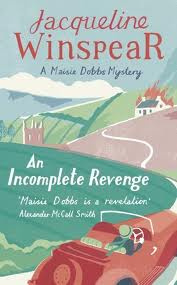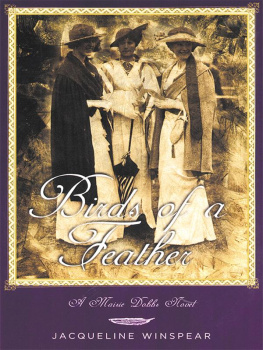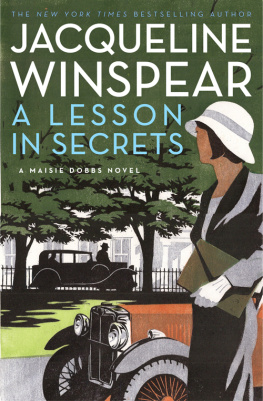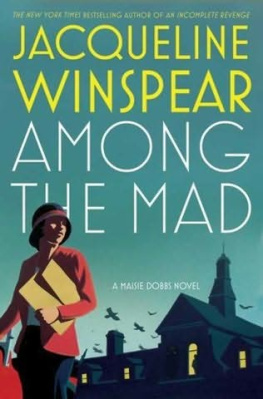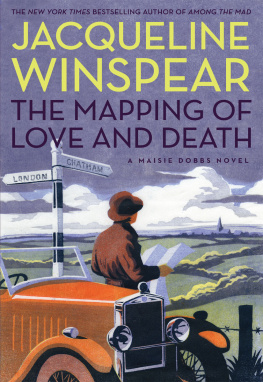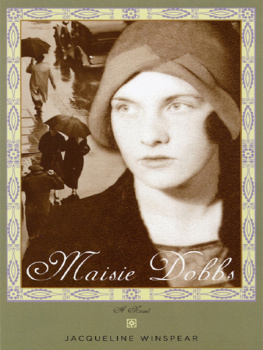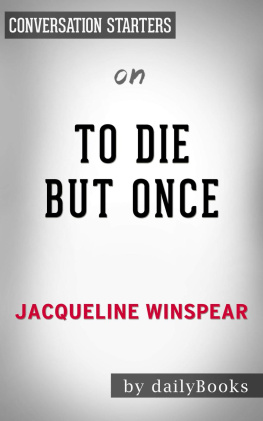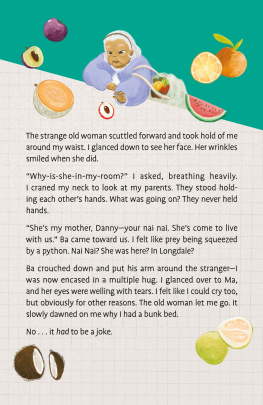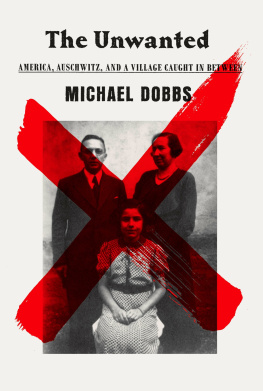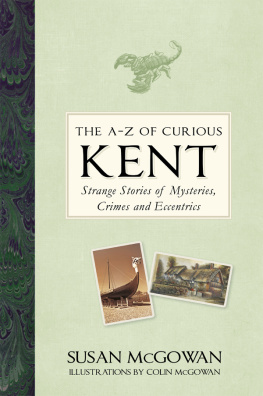ACKNOWLEDGMENTS
To my friend Holly Roseas always, thank you for being the first and most important reader of my work. Your thoughtful commentary and unfailing support are so deeply appreciatedthank you.
To my parents, Albert and Joyce Winspearthank you for your wonderful stories about being down hopping and for providing me with the circumstances that formed my own memories of those good times. And to the Webbs, wherever they are, for the gift of friendship to two just-married escapees from post-WW II London who came to Kent to start life anewyou are remembered with great affection, and I have cherished my parents stories of your kindness.
As with my previous novels, thanks must go to the staff of the Imperial War Museums library and archivesa truly priceless resource.
To John Sterling, Maggie Richards, and the wonderful team at Henry Holt in New York; to Frances Coady and everyone at Picador; and to Roland Philipps, Heather Barrett, and the staff at John Murray Publishers in Londonthank you for your support and your regard for Maisie Dobbs.
To my dear friend, wise mentor, and amazing agent, Amy Rennertthank you for your support, counsel, and insight. I am blessed to be working with you.
And to my husband, John Morellthank you, for everything.
ABOUT THE AUTHOR
JACQUELINE WINSPEAR is the author of four previous Maisie Dobbs novels, Maisie Dobbs, Birds of a Feather, Pardonable Lies, and Messenger of Truth. Maisie Dobbs won the Agatha, Alex and Macavity Awards; Birds of a Feather won the Agatha Award and Pardonable Lies won the Sue Feder/Macavity Award for Best Historical Mystery. Originally from the United Kingdom, Winspear now lives in California.
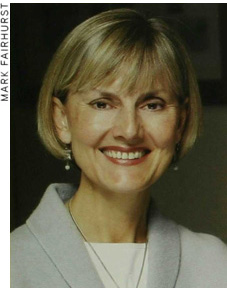
JACQUELINE WINSPEAR is the author of four previous Maisie Dobbs novels, Maisie Dobbs, Birds of a Feather, Pardonable Lies, and Messenger of Truth. Maisie Dobbs won the Agatha, Alex, and Macavity Awards; Birds of a Feather won the Agatha Award; and Pardonable Lies won the Sue Feder/Macavity Award for Best Historical Mystery. Originally from the United Kingdom, Winspear now lives in California.
PRAISE FOR JACQUELINE WINSPEAR AND MAISIE DOBBS
In Maisie Dobbs, Jacqueline Winspear has given us a real gift. Maisie Dobbs has not been createdshe has been discovered. Such people are always there amongst us, waiting for somebody like Ms. Winspear to come along and reveal them. And what a revelation it is! Alexander McCall Smith
When people ask me to recommend an author, one name consistently comes to mind: Jacqueline Winspear.... In this series, Winspear chronicles the uncharted, sometimes rocky path chosen by her protagonist and delivers results that are educational, unique and wonderful. USA TODAY
A sleuth to treasure. THE NEW YORK TIMES BOOK REVIEW
The mood and atmosphere of the period ring with authenticity, and the class tension that underlies many of Maisies dealings lends the narrative extra sparkle. SAN FRANCISCO CHRONICLE
[A] superior series. THE SEATTLE TIMES
[Winspear] keep[s] her series about the astonishing Maisie Dobbs alive and as fresh as new paint.... In each book, Winspear has used a crime to widen our vision of what life was like in England in the years after the war. CHICAGO TRIBUNE
Jacqueline Winspear has opened the eyes of many American readers to a forgotten world.... Winspear excels in depicting trauma, the kind of longterm grief that characters, particularly her restrained Britons, express only in a gesture or a word. THE BOSTEN GLOBE
A detective series to savor. TIME
ONE
Marta Jones surveyed her students, casting her eyes around the studio, with its high ceilings and skeins upon skeins of colored yarn hanging from laundry racks raised up with pulleys and secured on the wall, and the six wooden looms pressed against one another, for space was at a premium. Her deska battered oak table set next to the doorwas covered in papers, books and drawings, and to her right, as she faced her class, an ancient chaise longue was draped with an old red velvet counterpane to hide darnings and tears in the upholstery. Several spinning wheels were set against the wall to the left of the room, alongside a box where she kept wool collected on Sunday excursions into the country. Of course, she ordered untreated wool directly from her suppliers, but she liked to collect tufts from the hedgerows, where sheep had pressed against hawthorn or bramble to ease an itch and left behind a goodly pull of their coats.
She had taken on students with some reluctance. Even though the rent on her studio close to the Albert Hall was cheap enough due to an ancient land law that provided for artists, her commissions had diminished and she was forced to look for additional income. So she had placed one small advertisement in the newspaper, and written to those who had purchased her works in the past, to let them know that she was taking in a small number of students to learn the art and craft of traditional tapestry. In general, her students were a motley group and definitely better off; the working classes could barely afford to eat, let alone spend money on frivolities. There were two ladies from Belgravia who thought it might be rather fun to spend a Saturday afternoon or evening here each week, chatting as they worked their shuttles back and forth, following the sketched cartoon image that lay beneath the lines of warp and weft.
Another two friends, well-funded students from the Slade seeking a class beyond their regular curriculum, had joined, as had a poet who thought that work in color would enhance the rhythm and pulse of his language. Then there was the woman who spoke little but who had come to Martas studio after seeing the advertisement. Watching her now, the artist was fascinated by this particular student, drawn to the changes she had observed since class began. The woman had explained that she had recently been exposed to the world of artshe said it as if it were an unfamiliar countryand that she wanted to do something artistic, as her work was far removed from such indulgence. She had smiled and gone on to say that she had never produced a proper painting, even as a child, and she thought she could not sketch at all, but she was drawn to tapestry, attracted to the weaving of color and texture, to a medium that did not present an immediate image but, when one stood back to regard the days endeavor, a picture began to take form. Its rather like my work, she had said. And when Marta asked about the womans profession, she paused for a moment and then drew out a card, which she offered to the artist. It said, simply:
MAISIE DOBBS
PSYCHOLOGIST AND INVESTIGATOR
Marta thought that this one evening each week was the womans only recreation, but with each class, something about her seemed to change almost imperceptibly, though the artist found the effect to be quite extraordinary. Her clothes had become more colorful, her artistry more bold as she gained confidence. On the evening when they had experimented with dyeing, taking the yarns they had spun during the previous week, pressing them down into buckets of dye, and then pulling them out to hang first over sinks in the studios own scullery before looping them over laundry racks to dry, she had rolled up her sleeves and simply laughed when color splashed across her face. The Belgravia matrons had frowned and the poet appeared shy, but soon this woman, who had appeared so reticent at first, so slow and measured in her interactions with fellow students, had come to be the lynchpin in the classwithout saying much at all. And, Marta thought, she was very good at drawing out stories. Why, only today, while Maisie worked at her loom, her fingers nimble as she wove threads of purple, magenta and yellow, she had asked the teacher but two questions and soon knew the entire story of the womans coming to England from Poland as a child. In fact, as she answered the questions that Maisie Dobbs put to her, the whole class knew in short order that Martas father had insisted that his children learn only English, so that they would fit in and not be marked as foreigners. And her mother had ensured the family dressed in a way that did not set them apart from their new friends, who knew them as the Jones familythat most British of names, adopted as they disembarked from their ship once it had docked at Southampton.

